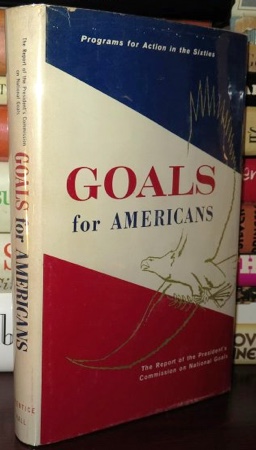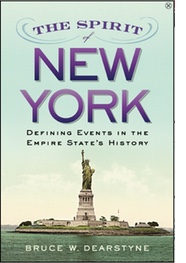Voters Are Glum. Here’s One Way to Change that.

We need a national conversation on renewing the nation's purpose. Two initiatives from 1960 suggest a possible approach.
America is in the doldrums these days. About 70% of people surveyed in a recent Gallup poll said they were dissatisfied with the way things are going in the U.S. The 2016 presidential election campaign revealed that many Americans are disillusioned with traditional politics and political parties and downcast about the future. Only about 58% of eligible voters actually cast their vote in the election. As Donald Trump begins his presidency, people seem on edge.
The nation is divided, fretful, adrift, in need of some public soul-searching about values, purposes, and priorities.
The late 1950's was another time of uncertainty and public yearning for both reconnecting with the past and charting a hopeful future.
 As George M.
Marsden explains in his book The Twilight of
the American Environment: The 1950's and the Crisis of Liberal
Belief, the decade was mostly a time of
prosperity and peace, but technology (particularly television) and
mass culture threatened to erode the nation's traditional moral
character and its respect for authority and sense of community. The
country's literary, political, secular and liberal elites seemed to
be falling short of articulating a new paradigm of guidance and sense
of purpose.
As George M.
Marsden explains in his book The Twilight of
the American Environment: The 1950's and the Crisis of Liberal
Belief, the decade was mostly a time of
prosperity and peace, but technology (particularly television) and
mass culture threatened to erode the nation's traditional moral
character and its respect for authority and sense of community. The
country's literary, political, secular and liberal elites seemed to
be falling short of articulating a new paradigm of guidance and sense
of purpose.
Two very different initiatives in 1960 attempted to help fill this vacuum. They could serve as partial models for what is needed today.
The President's Commission on National Goals
On February 7, 1960, President Dwight D. Eisenhower created a Commission on National Goals to identify the best ideas for developing American society and maintaining American leadership against aggressive Communism and "in the worldwide struggle for realization of decent conditions of life" around the globe. Headed by Dr. Henry Winston, president of the American Assembly, a policy think tank at Columbia University, the commission included leaders from industry, labor, law, and academia. The Commission sponsored research papers on 15 topics and issued a 372 page report in November, which it distilled into a 33 page summary, and boiled down still further to a snappy "Goals for Americans" booklet that was widely distributed and discussed.
The report placed heavy emphasis on individual development, judgment, and initiative. Its "What Can I Do? A Citizen's Checklist" section included, for instance, "Do I try to pair the pursuit of happiness with the pursuit of excellence, to strike a balance between comfort and purpose in my private life?" It called for an end to "the last stubborn barriers to equal justice and opportunity" – religious intolerance, barriers to women, and racial discrimination. It advocated more investment in education, the arts, and sciences. Recommendations for harnessing technological change and progressive economic policies were designed to keep the economy expanding and unemployment down. It endorsed action to improve urban living conditions and broaden medical care.
"The United States, though omnipresent, is not omnipotent," the report asserted. It reaffirmed the nation's Cold War mission of standing firm against Communist expansion and endorsed aid for less developed nations. But it also advanced a long-term goal of reducing the nuclear threat and reduce the level of armaments.
The report sparked some public discussion, particularly over its domestic recommendations. Its mildly progressive tone was informative but unexciting. The New Republic called the report "humane, high-minded, and vague. It expresses a consensus of moderates." On the other hand, conservatives grumbled that it tilted too much toward government action and spending.
Life/New York Times series on the National Purpose
In the spring of the same year, 1960, Life magazine and the New York Times commissioned a series of essays on "The National Purpose." Henry Luce, editor of Life, explained in launching the series that America had become the greatest nation in the world but posed the questions of whether the nation was "great in the right way" and what we should "do with the greatness." Like the President's Commission that same year, the eight writers were all white men, but their essays were diverse, imaginative, insightful and provocative.
They exhibited a general consensus that the "national purpose" had been spelled out in the Declaration of Independence and the Constitution and that it boiled down to preserving liberty. They generally agreed that that purpose needed reaffirmation, refreshing, and strengthening, rather than superseding it with something new.
Their individual essays presented a stellar array of ideas. For instance:
● Need to regain our youthful energy to confront problems.Clinton Rossiter, an influential historian, opined that we had lost the "youthful sense of mission" that had propelled the nation during most of its history. We had become self-indulgent and complacent. We were once a people "on the make" but now were more like a people who "has it made," willing to tolerate mediocrity, unwilling to energetically confront new challenges. Rossiter identified four great challenges: (1) a crisis in race relations, "the oldest, most puzzling, and most distressing [issue] with which we have ever been faced or may be." (2) the "crisis of culture" – "we lack a widespread popular respect for the fruits of art and learning" and we tolerate too much "vulgarity, bad taste, and ugliness." (3) the "crisis of community," including growing income inequality, the high incidence of delinquency and crime, and urban blight. (4) the "crisis of peace and war" including pouring "an appalling amount of money, resources, skills and energy" into production of weapons we pray we never have to lose. Rossiter offered few solutions beyond suggesting we could solve these problems through recovering our youthful spirit and resolve.
● Education and individual initiative are the keys to the future. Adlai Stevenson, former governor of Illinois and the Democratic presidential nominee in 1952 and 1956, advanced an argument that we had become disengaged, disinterested, and complacent as a result of our affluence. "With the supermarket as our temple and the singing commercial as our litany," he asked, "are we likely to fire the world with an irresistible vision of America's exalted purposes and inspiring way of life?" Americans needed to develop "a respect for education and a sense of discipline in the attainment of knowledge," and "new standards of respect and reward for intellect and culture."
● Personal morals and values are the key.Protestant evangelist Billy Graham's essay was in some ways the most pessimistic and unsettling of the writers. He argued that the nation was afflicted by a "moral and spiritual cancer" that valued affluence and material gain, demeaned morality, and rendered us vulnerable to an affliction of "emptiness and boredom." He offered multiple strategies: more individualism and less conformity; renewal of a sense of patriotism; more "hardiness and discipline" in our work; the courage to take stands even if unpopular; and a willingness to champion "the little people of the world, the hungry, the homeless, the oppressed, the discriminated against, the captives and those who live in countries where there is no freedom."
These essays mostly agreed that the nation's ideals and purposes were still intact and adequate but that self-indulgent affluence and materialism had dulled our sense of initiative and inventiveness and our ability to fight aggressive Communism. They argued for a pragmatic approach to the issues confronting the nation and revival of our faith in progress and our tradition of problem-solving.
Both the President's Commission and the Life/New York Times series articulated some underlying themes: the sense that we needed to break out of a period of lethargy; need for a new way to build on old traditions and values; and the role and responsibilities of individuals as well as government.
The two initiatives both picked up on and added to the zeitgeist of the time: complacency giving way to anxiety and a sense that the nation could be doing better. Senator John F. Kennedy, running for president, expressed it well in his first televised debate with Vice President Richard Nixon on September 26, 1960: "I am not satisfied as an American with the progress that we're making. This is a great country but I think it could be a greater country, and this is a powerful country but I think it could be a more powerful country.... I think we can do better.... I think it's time to get America moving again."
Toward a new conversation about national purpose
President Trump seems unlikely to sponsor a discussion of national purpose as President Eisenhower did, and the great media giants seem too weak or distracted to initiate a conversation as they did in 1960.
But a new national conversation initiative might be organized by a respected, non-partisan group such as the National Governors' Association, the League of Women Voters, a history organization, a foundation, a think tank, or a consortium of educational and cultural organizations.
The writers this time must, of course, include women as well as men and represent the magnificent diversity of the nation.
Their essays or papers should then become the starting point for broad public conversation on how Americans can come together to build a strong future for the nation.
The conversation might focus on these questions:
● What are the most important lessons and insights that we should draw from American history and how should we apply them going forward?
● What are the key values and principles that should guide us as we build the nation's future?
● What are the best features of our nation and how should we strengthen them?
● What are the problems that most need correcting in our nation, and how should we go about addressing them?
● How can government regain and retain the respect, confidence, and support of the American people?
● What can individuals do every day to promote social justice, fairness, and national unity?